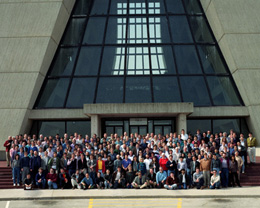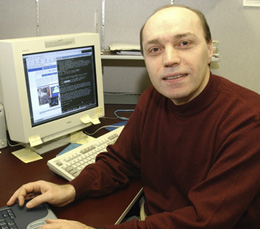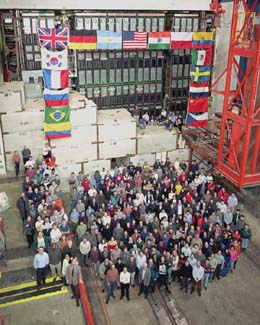 |
|
Lingua Physica "Science knows no country, because knowledge belongs to humanity, and is the torch which illuminates the world." - Louis Pasteur by Judy Jackson It is a truism that high-energy physics is a science without borders,research that brings men and women of every nationality together in the giant collaborations that characterize the field.
But what does this internationalism really mean?The statistics that we often cite —the 983 physicists from 131 institutions in 29 countries who work on experiments at Fermilab,for example —don ’t really give a true picture of the United Nations of Physics that characterizes experiment collaborations today. That ’s because our statistics capture the nationalities only of participating institutions,not of the scientists themselves.So a physicist from Purdue University,say,who actually comes from the Czech Republic,or a Berkeley researcher who hails from Seoul,gets recorded in the “U.S.”column because he or she comes from a U.S.institution. To get a better sense of the nationalities represented in modern physics experiments,FERMINEWS conducted a thoroughly unscientific and completely unofficial survey of the laboratory ’s two largest collaborations,CDF and DZero.We asked the collaborators to tell us by email what languages they speak.We figured that the languages that turned up would give us a pretty good idea of the diversity of the experimenters ’nationalities.By the time we finished reading the email returns,we had compiled a list of 62 different languages (not counting Pig Latin)including some we had never heard of. Of course,English is the official language of Fermilab experiments,the language of collaboration meetings,of publications and of everyday life at the laboratory.Nevertheless,if you walk through the Fermilab cafeteria at lunchtime on any given day,you will almost certainly hear at least a few of the languages on the list.
MEGRELIAN? “Megrelian belongs to the Georgian family of languages,along with,for example, Abkhazian and Swan —all in the Caucasus. They all have in common very fundamental words,like God,bread,mother,etc.,but are very different nowadays.For example, in spite the fact that I am fluent in Georgian and Megrelian,I can ’t understand the language spoken in Swaneti a (region of Georgia). “A few facts.The Georgian language is spoken by about five million people,while Megrelian by about one million.Megrelian (some call it Mingrelian) has some commonalities also with Laz,the language spoken in regions of the Black Sea coast,Caucasus. “Thanks for your interest in Megrelian (the language of the region of Georgia where I was actually born and I like so much)!”
WOLOF? Wolof is a language spoken in the West African countries of Senegal and Gambia and Mauritania.
It is the most spoken language in the first two countries.About 80 percent (seven million people) of the population in Senegal speak Wolof even if the Wolof ethnic group itself accounts for only about three million.My own country of origin is Senegal,a former French colony and the western most country in Africa.Hope this little introduction will do.
LECCESE? “I ’m coming from the district of LECCE so my dialect is Leccese.It is actually an Italian dialect with some mixture —very marginal indeed —of Greek and ancient Latin words.I also spent the last 16 years in Pisa (Tuscany)my wife being from that region,so I also know some Tuscan dialect. But it doesn ’t help as modern Italian is actually by definition (from Dante and so on )the language of Tuscany....”
WHAT ABOUT YOU?
|


